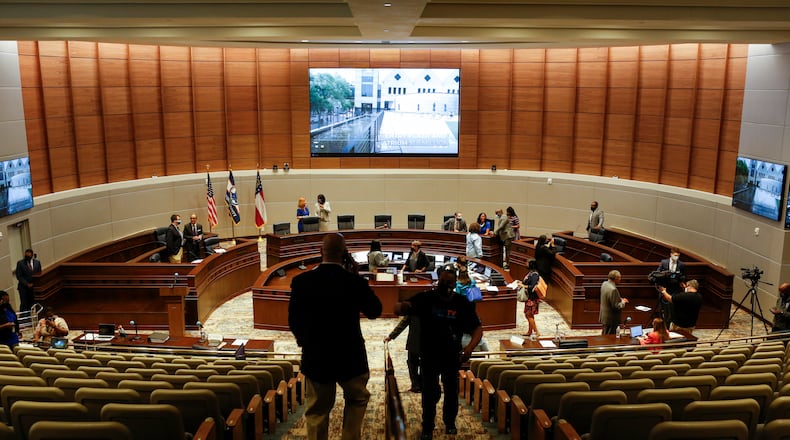Fulton County commissioners passed a $1.25 billion budget Wednesday with more money to improve elections and clear the backlog of court cases.
General fund spending is slated to increase 6% this year, to about $847 million — about $464 million of that is for personnel and $383 million for operations. With county finance officials expecting $746 million in revenue, they expect to draw $101 million from the general fund balance. There has been no change to the millage rate.
The budget vote was 5-2, with commissioners Bob Ellis and Lee Morris voting against.
Highlights include $38 million to elections along with eye-catching sums to clear the court backlog. The county has already promised $75 million but that is a fluid number that could easily double. There is also an additional $16 million planned for COVID-19 testing/vaccination site costs not covered by the federal government.
Fulton has 11,000 court cases caught up in the county’s backlog caused by COVID-19 shutdowns. Fulton’s backlog is worst in the state, with 206,000 cases clogging the system. Arguments over this topic have led to the district attorney and sheriff coming down and demanding money from commissioners, banging on lecterns and pointing fingers.
The county pledged $75 million of federal funds to cover an additional 300 staff over the next few years, in addition to opening court on the nights and weekends. But that costs are sure to grow.
In this year’s budget, the county plans to spend $22.7 million on the justice system. That includes $5.5 million for 55 new district attorney positions to handle the backlog, and $630,000 to lease office space. Commissioners also promised a one-time $14.6 million to address over-crowding at the jail during the pandemic.
The other notable category is the elections department’s $38 million, which includes $5 million in operating expenses.
But that may not be all the department will need.
Commissioners decided to fund three elections, despite the possibility of a runoff at the end of this cycle. They told elections officials to hope for leftovers from the other three elections or salary savings.
“That is somewhat surprising,” said Fulton elections director Richard Barron at a Thursday meeting of the county elections board. He added they may “have to go back to the commissioners” for more money.
Barron for months has said elections are about to get more complicated and expensive.
When asked why elections costs have ballooned recently, Barron said: “The budgets have gone up essentially 300% with the advent of this new voting system.”
Even before COVID-19 changed everything, Georgia decided to perform the largest rollout of new elections equipment in U.S. history via a $107 million contract with Denver-based Dominion Voting Systems, which installed 30,000 voting machines.
Barron said their $38 million this year would help the 45-member department and thousands of temporary workers create a smooth election. That would put it in line with the record-breaking $38.3 million that Fulton spent on the blockbuster 2020 election cycle. Fulton spent $9.9 million in 2016 and about $6.1 million in 2012.
The department received $9 million less than requested during the budget process, said Fulton CFO Sharon Whitmore on Wednesday. She said the base cost of the elections department during a non-elections year is about $4.5 million.
Elections board chair Cathy Woolard said they may be looking at an actual budgetary need of $53 million.
Commissioners, mostly the Republicans on the county board, have been alarmed at the skyrocketing price tag to run elections. Democrats push back by saying it was the Republican-run state that signed the contract.
“That amount to me is staggering,” said Commissioner Liz Hausmann, a Republican.
Part of the money is required, according to county officials, because they need to address new restrictions required by Senate Bill 202. The bill gives the Republican-controlled state the ability take over elections in the Democrat-heavy county and disallow them from using grant funds. Last cycle, Fulton used $14 million in grant money.
Credit: WSBTV Videos
About the Author
The Latest
Featured



